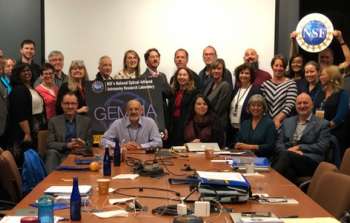sci19073 — Announcement
Planning for a New Era in Astronomy Communications
November 21, 2019
In early November, the GEMMA (Gemini in the Era of Multi-Messenger Astronomy) project brought together science communications professionals to explore the unique opportunities and challenges of communicating Multi-Messenger and Time-Domain Astronomy, two rapidly growing fields in astronomy. Funded by the US National Science Foundation, this communications summit hosted more than 30 participants for two days at the Space Telescope Science Institute in Baltimore, Maryland, an AURA-managed facility.
About the Announcement
| Id: |
ID
sci19073
|
